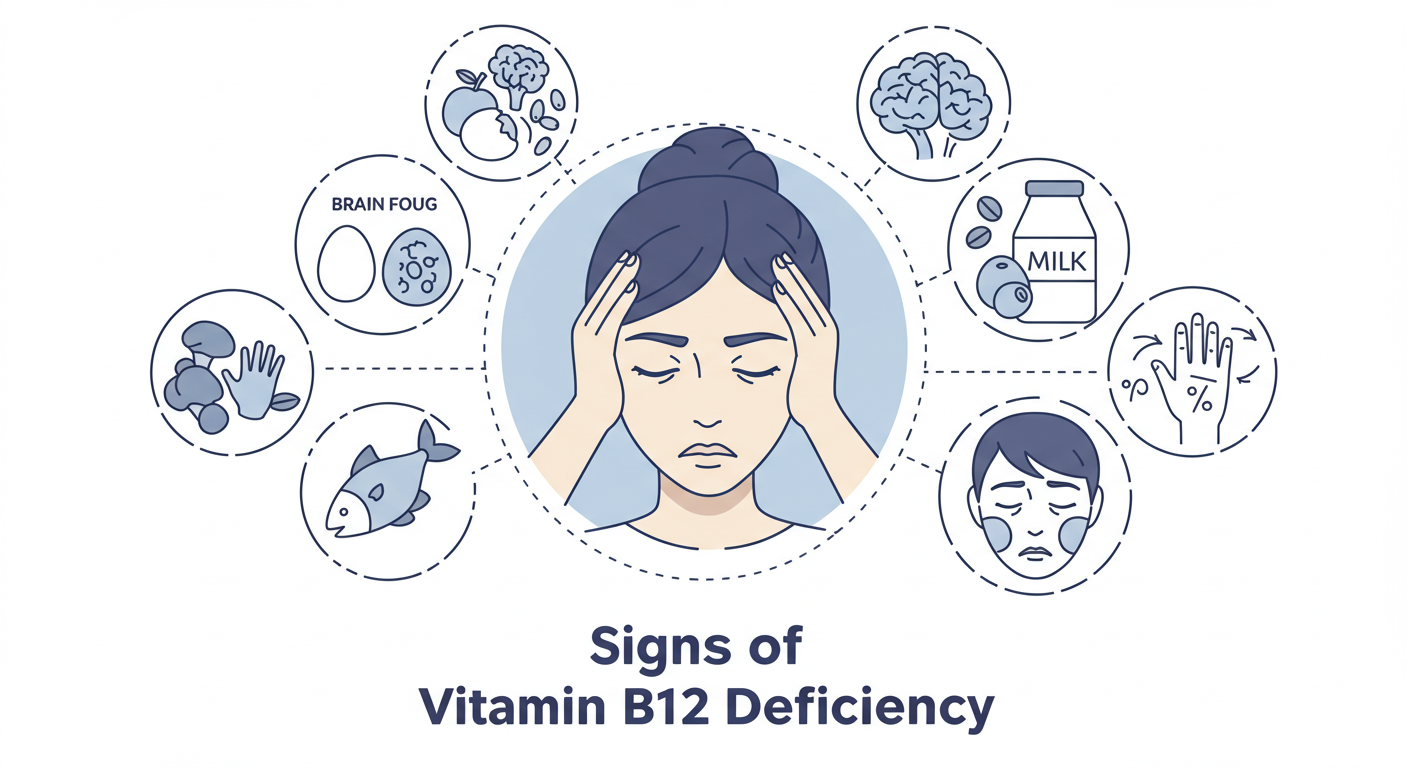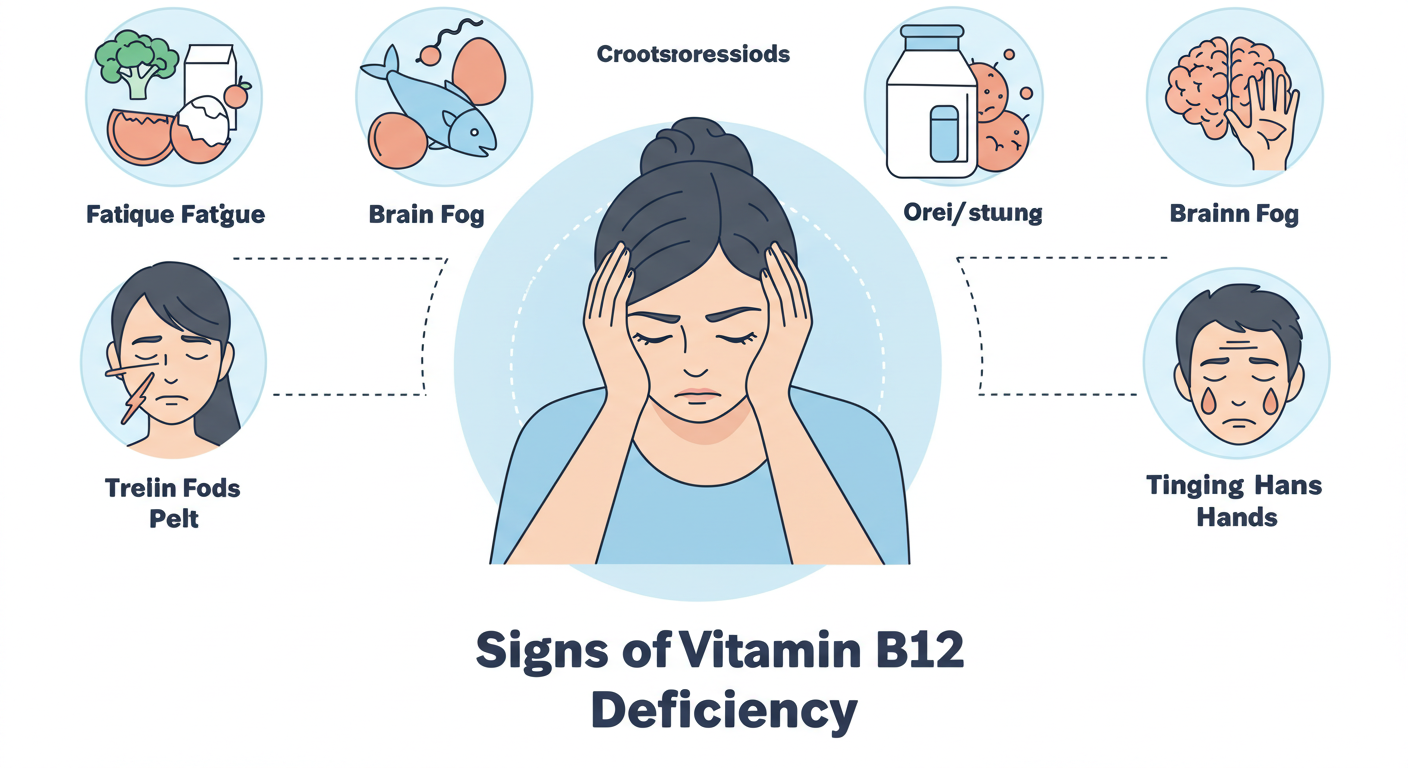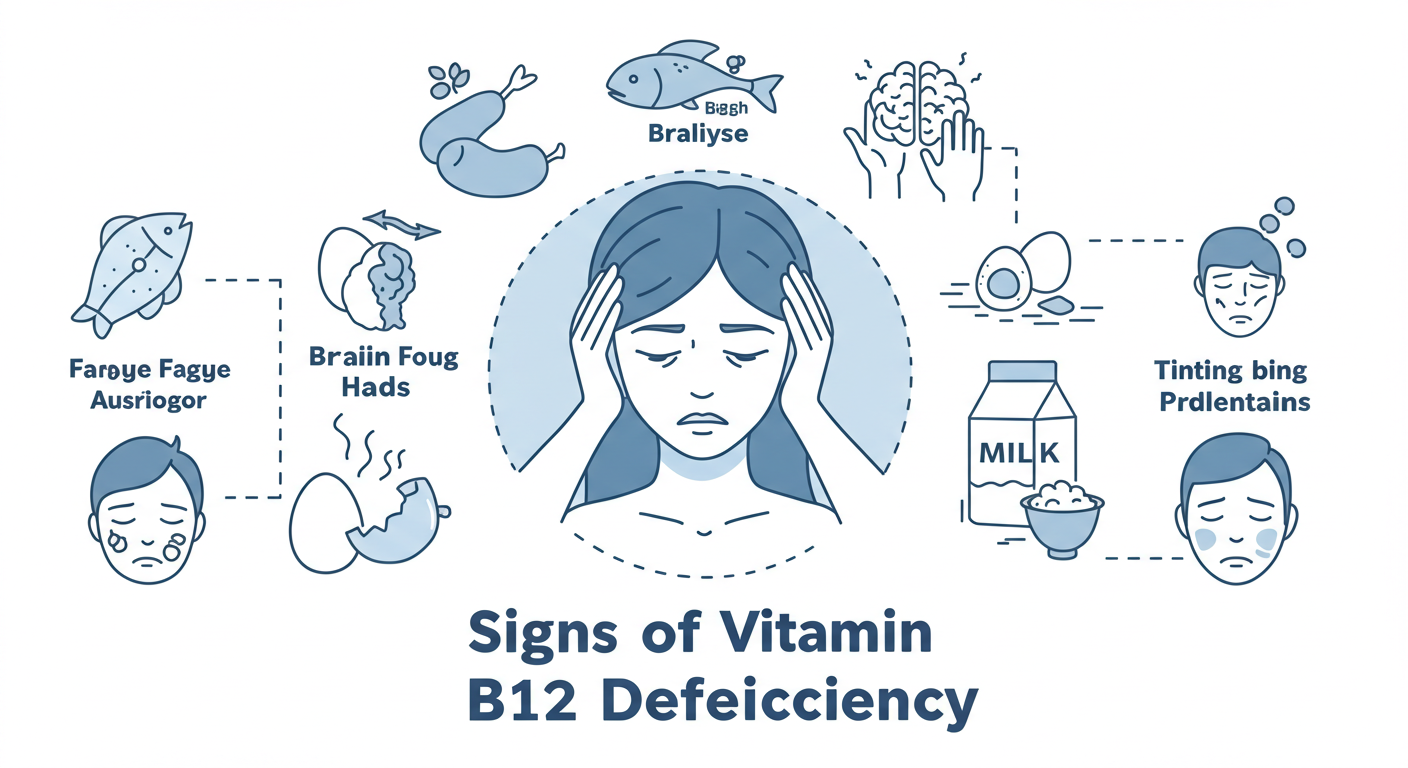Signs You Need More Iron | Symptoms of Iron Deficiency Explained
Feeling tired, dizzy, or pale? Discover the common signs you may need more iron and how to treat iron deficiency naturally through diet and supplements.

Discover the warning signs of Vitamin B12 deficiency — from fatigue and brain fog to nerve damage. Learn what causes it and how to treat it naturally.
Vitamin B12 is an essential nutrient that plays a vital role in keeping your nerves, blood cells, and DNA healthy. A deficiency can lead to a wide range of health issues, and if left untreated, it can cause irreversible nerve damage and neurological problems.
Let’s explore the most common signs of Vitamin B12 deficiency, why it happens, and how to prevent it.
Read More: Best Foods for Healthy Eyesight

Table of contents [Show]
Vitamin B12 (cobalamin) is a water-soluble vitamin found naturally in animal-based foods such as meat, eggs, and dairy. It’s also available as a supplement or in fortified foods.
Your body needs B12 to:
Produce red blood cells
Maintain brain and nerve function
Support energy metabolism
Create DNA
Since the body doesn't produce B12 on its own, you need to consume it regularly through food or supplements.
1. 🩸 Fatigue and Weakness
Without enough B12, your body produces fewer red blood cells, which means less oxygen is delivered to your organs. This results in tiredness, even after a full night’s sleep.
2. 🧠 Memory Loss or Brain Fog
Low B12 levels can affect your cognitive abilities, causing memory problems, confusion, difficulty concentrating, and even symptoms similar to dementia.
3. 😖 Numbness or Tingling
Vitamin B12 is crucial for nerve health. A deficiency may cause numbness or tingling in the hands, legs, or feet — often described as “pins and needles.”
4. 😩 Mood Changes and Depression
B12 is linked to the production of brain chemicals like serotonin and dopamine. A deficiency can lead to depression, anxiety, irritability, or mood swings.

5. 👅 Glossitis and Mouth Ulcers
People with B12 deficiency may experience an inflamed tongue (glossitis), mouth sores, or a burning feeling on the tongue and lips.
6. 🌬️ Shortness of Breath and Dizziness
Because of reduced oxygen in the blood, some people experience lightheadedness, difficulty breathing, or heart palpitations even with mild activity.
7. 😴 Pale or Jaundiced Skin
B12 deficiency can cause pale skin or a slightly yellow tint due to the breakdown of red blood cells (hemolysis).
8. 👁️ Blurred Vision
In severe cases, B12 deficiency can damage the optic nerve, leading to vision problems like blurred or double vision.
Common causes include:
Poor diet (especially vegan or vegetarian without supplements)
Malabsorption disorders (like celiac or Crohn’s disease)
Pernicious anemia (autoimmune condition affecting absorption)
Use of certain medications (e.g., metformin, PPIs)
Age (older adults have reduced absorption ability)
You may be at higher risk if you are:
Over 60 years old
Vegan or vegetarian
Diagnosed with gastrointestinal disorders
Taking diabetes or heartburn medication long-term
Had weight-loss or intestinal surgery
Prevention
Eat foods rich in B12: meat, fish, eggs, dairy, and fortified cereals.
Vegans should take B12 supplements or consume fortified foods.
Treatment
Oral supplements or sublingual B12
B12 injections (for severe cases or malabsorption)
Regular B12 monitoring in at-risk groups
Always consult your healthcare provider before starting supplements.
Vitamin B12 deficiency can sneak up on you — but the symptoms are clear and serious. If you’re feeling tired, foggy, or experiencing unusual sensations, talk to your doctor and consider a simple blood test. Early detection and proper nutrition can help restore your energy and protect your nervous system.

1. How do I know if I have a B12 deficiency?
A blood test is the only way to confirm B12 deficiency. If you experience symptoms like fatigue, numbness, or memory issues, consult your doctor.
2. Can B12 deficiency be reversed?
Yes. With proper treatment — through diet, supplements, or injections — most symptoms improve or go away.
3. Is B12 deficiency serious?
If untreated, it can cause permanent nerve and brain damage. Early diagnosis is key.
4. What foods are highest in B12?
Beef liver, sardines, tuna, eggs, milk, and fortified cereals are great sources.
5. Can I take too much B12?
Vitamin B12 is water-soluble, so excess is usually excreted through urine. However, always follow your doctor’s advice.
Knowledge Galaxy shares expert-backed insights on health, wellness, science, and daily living. Our mission is to simplify complex topics and empower you with practical knowledge for a smarter, healthier life.
Feeling tired, dizzy, or pale? Discover the common signs you may need more iron and how to treat iron deficiency naturally through diet and supplements.
Learn proven ways to keep your joints strong, flexible, and pain-free. Boost mobility, prevent injury, and maintain joint health at any age.
Discover the top 10 best foods for healthy eyesight. Learn how nutrients like vitamin A, omega-3s, and lutein support vision and protect your eyes naturally.
